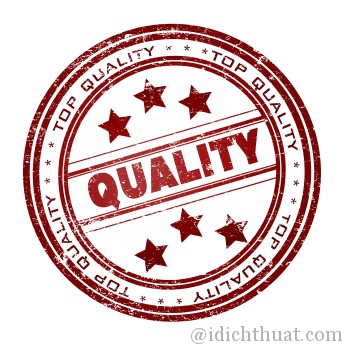Factors To Consider When Evaluating Translation Services
Evaluation is an important condition to ensure an effective translation service. Therefore, before signing a contract with a certain supplier, you should consider several other suppliers by asking questions as detailed as possible, besides you should ask the translator to provide a Some sample cases have similar requirements for the translation job you need. If the suppliers agree to show you those sample work contracts, you can assess who is the right supplier for your needs.
In this introduction, we'll discuss in detail the factors to consider (and the best pricing) when choosing a translation agency:
+ Note: 7 Things to Note for Good Translation
The evaluation of translation services is not just about determining the price but also includes factors such as: completion time, quality, surcharges, and discount factors.
1, Completion time: determine the date / time the translation service provider delivers the translation to you, aka the time that they complete the work you requested. If you require the work to be completed in less time than the allotted time, then you may have to pay extra or receive poor quality translation.
This reason is also quite legitimate, the smaller the completion time, the supplier must choose one of the following conditions:
- Need to use many people for the project.
- Ask employees to work overtime.
- Work on time but execution speed is faster than usual resulting in poor quality.
IN idichthuat, We have a team of passionate and professional freelancers working in many provinces and cities, so the time factor is handled accurately by our customers.
2, Quality: while all providers guarantee high-quality translations, true quality can only be determined after seeing a sample translation that the supplier has produced. There are some providers who are willing to translate a free sample snippet for your reference, and others charge a fee for the reference translation. Whether they charge a fee or not, this is a good way to evaluate a supplier.
At idichthuat, we often translate 1 paragraph (for free) or provide demos of translated projects (with the same major) for customers to check the quality of the team if required.
3, Discounts and surcharges: Unlike the above two criteria, this is not an important provision in evaluating translation services. However, it is also useful in making a decision to use a certain provider's services.
Service providers can offer discounts for large volumes of content (we reduce 5-10%) or for specific audiences (for example, students).
Likewise, they may charge extra for certain languages that are not available in the market by many providers, or they may charge an additional fee for working on a holiday, holidays or night shifts.
Especially at idichthuat The price of translation only charges 1 single price and does not increase the price even though it is a holiday, holiday or night shift.
When you compare reviews of different providers you will get a brief list of suppliers that meet your requirements, so you will easily determine which one is the best fit for you. with your translation needs.
Sharing translation experiences
Contact us today for the fastest service quote and consultation.

Nguyen Trung Khang - Talented interpreter and translator, passionate about translation
Nguyen Trung Khang is a talented interpreter and translator, with many years of experience in the field of translation and linguistics. He graduated from Ho Chi Minh City University of Education, majoring in Linguistics in 2015.
After graduating, Mr. Khang participated in a professional interpretation and interpretation training course at the University of Foreign Languages - Hanoi National University. He achieved a high-level certificate in interpreting and interpreting, and was also awarded a master's degree in linguistics.

